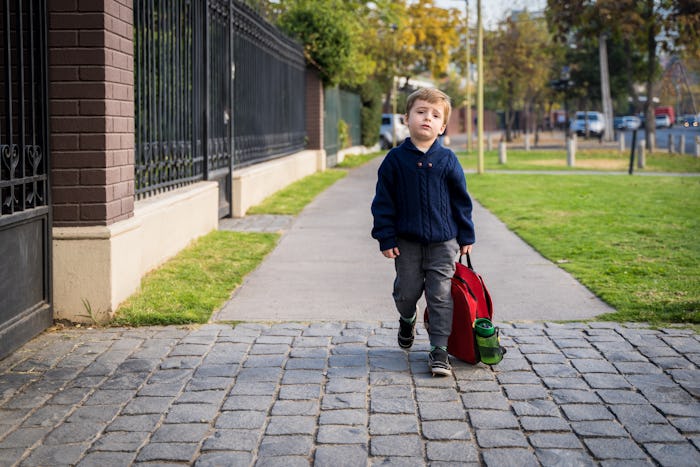Life

Entering a new classroom for the first time is a big deal for most kids, and it can be a nerve-wracking experience. Who will sit by them in the classroom, and will they get lost navigating the school building? Fortunately, there's a lot that educators can do to help kids ease into the new school year. Hopefully these strategies will make your kid feel right at home in no time.
By using technology, social mixers, and even storytelling, teachers and administrators alike can help kids make the transition out of summer. When your kid has a clear sense of what the year ahead will bring, as well as a couple of buddies in the classroom already, then the whole experience should be much less scary. Of course those first-day nerves are perfectly normal and even expected, but schools now have so many ways to help kids adjust.
To aid in their efforts, parents can also do a lot to help prepare their kids for school. Attending an open house event, and remaining positive when talking about school, are two ways parents can help out. When parents and educators work together, your kid's transition back to school can be a total breeze.
1
Introduce Classmates Before The School Year Begins
If your kid looks forward to seeing a familiar face in the classroom, then the transition to school can be a little less scary. "First time students experience an induction program which begins in May with play dates and story times at school to help them become comfortable with the facilities and faculty," Erin Woodhams, director of marketing, admissions & communications at the British International School of Chicago, tells Romper of her school's policies. See whether your kid's school offers a similar program.
2
Meet The Teacher & Classroom Ahead Of Time
Some schools offer plenty of background info about your kid's teacher and classroom before the year begins. "All children (new and returning) receive a class list in June with the pictures of their classmates and their teacher (with bio) so they can see who will be in their class next year," says Woodhams. "All teachers make a short video introducing themselves (interests, hobbies, teaching stories, etc.) and these are emailed to the families so the children (and parents) can watch them before school starts." Perhaps your child's school has a similar prep program (if not, see if there's any way your child could stop in for a visit).
3
Open Classroom For Early Visits
Sometimes the thought of navigating a huge school building alone is unnerving to kids, so schools help them become familiar with the environment ahead of time. "Attend your child’s meet the teacher or back to school event. This is a good time for your child to meet his or her teachers and get acquainted with the layout of the school," advised the Paradise Valley School District. Just seeing the classroom beforehand can help ease your kid's nerves.
4
Read A Story About First-Day Nerves
Some teachers use story time as a way to help kids explore their fears and excitement about starting the new school year. "Literature provides insight and comfort for a wide variety of situations, and first-day jitters are no exception," as longtime teacher Beth Lewis wrote in ThoughtCo. Lewis recommends two books in particular, First Day Jitters by Julie Danneberg and Judy Love, and Mr. Ouchy's First Day by B.G. Hennessy and Paul Meisel.
5
Address Expectations Clearly
There are a lot of unknowns when it comes to a new school year, and educators can help remove some of that ambiguity with clear instructions. "Be explicit about what is and isn’t acceptable behaviour, making sure you include a fair amount of repetition to ensure the messages get through, and talk clearly about good work habits and expectations," wrote psychologist Bradley Busch in The Guardian. Simply knowing what is expected of them at school will help some kids feel more secure.
6
Help Transfer Students Make Friends
Some schools go the extra mile in order to make students coming from far away feel more at home. "Children joining the school from another city or country get a buddy family with same age child, nationality or language to help them with the transition, this includes emails or facetime and then meet-ups over the summer once the new family is local," says Woodhams.
7
Prep Kids About The School With Videos
Schools also use tech to help kids get ready for the upcoming year. "We have a lot of videos showing school life that we share with new parents and they often show new students to help them feel excited about coming to their new school," says Woodhams. If your school offers similar vids, then review them with your children. With these tips in mind, hopefully your kid will feel a bit braver going back to school this year.
This article was originally published on